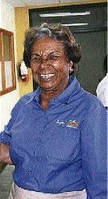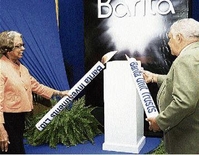$10,000 investment grows into billion-dollar business - Conservatism pays off for Humphries-Lewin
Published: Friday | November 13, 2009

Rita Humphries-Lewin, chair of the Barita Group, plans to take her company public. - File
After 32 years in her own business and some 47 years as a stockbroker, retirement is not a primary preoccupation of equities and investment management guru, Rita Humphries-Lewin.
Instead, she is busy writing the prospectus to take public the $1-billion company she started in 1977 with $10,000 from her own savings.
"I couldn't get any money to borrow from the banks," said the company chairman, an avid golfer who leaves the day-to-day running of the bank to a highly qualified executive team.
The absence of a bank loan may have been a blessing in disguise for the company which now commands an investment portfolio in excess of $11 billion. Humphries-Lewin says conservatism has been, and continues to be, the hallmark of the success of Barita, in which she retains 85 per cent ownership.
"It's a simple thing. I have always had a lot of respect for people's money," she told the Financial Gleaner in an interview.
Not to be played with
The maxim that clients' money is not to be played with remains at the core of the Barita's corporate philosophy.
"I was taught the Canadian way of doing business: getting rich quickly is not on. And tampering with clients' money - using clients' money to speculate - is not on. That has served me well."
To illustrate the point, Humphries-Lewin points to local Canadian financial institutions like Bank of Nova Scotia and FirstCaribbean Bank, which, she said, were spared exposure in the recent United States toxic assets debacle, while other less conservative banks got burnt.
Clientele comprised
Having built a track record on this basis, Barita now has a clientele comprised largely of mature, faithful investors, many of whom have taken the company's advice to invest for the long term.
"People who invest for the long term, will always make money. Those who invested in our capital growth fund have done well. Equities are what really provide growth. You can't get it from deposits, repos, government, etc."
Humphries-Lewin preaches disciplined saving by individuals and businesses as the 'ABC' of wealth creation.
"Individuals need to start early - by the time you are 30 years old - and put aside a certain percentage off your salary every month. It can be done by salary deduction or standing orders on your bank account."
In terms of the Barita's expansion plans, the stock market expert, who is head of the company, is waiting for the right time make the move. Already, its Unit Trust business has been merged with its investment and wealth management operations, giving holders of the 300-million shares in the former Barita Unit Trust Management Company, a share in Barita Investments.
Recruitment of additional staff and expansion of branches are in the pipeline for Barita it raises development financing from the public offer, according to the chairman. Barita now operates in Kingston, Mandeville and Montego Bay.
Last year, Barita Portfolio Management, a former subsidiary of the Barita group, split off from the company.
Humpries-Lewin said the parting of ways stemmed from a difference of views among the shareholders of the parent company and those of the former subsidiary about the decision to list on the Jamaica Stock Exchange (JSE).
"I had wanted to go public for a long time. They did not want to go public. But we still do business together," she said.
The former subsidiary, under the control of Peta-Rose and John Hall, has been rebranded BPM Financial.
Cusp of a new chapter
What of the early days and the road to where Barita now stands on the cusp of a new chapter?
Humphries-Lewin worked as a secretary and then as floor trader - the only women in the business then - on the young JSE with a Jamaica-based Canadian brokerage house, Pitfield. She was encouraged to start her own business by trader colleagues, who had moved into managing portfolios in insurance companies and banks.
She had been trained in Canada by the company but could not work as a trader there, women being barred from that line of work then.
"At that time there were hardly any brokers around. The stock market (having boomed in the 1960s) was down to nothing. In those days, the chairman of the stock exchange was the governor of the Bank of Jamaica."
She noted that, at in those days, companies like Caribbean Cement Company and the Jamaica Telephone Company were listed in the United States, Canada and England.
Being a woman in business in the Jamaica of that time was no major problem for her.
"One of the things we have as an advantage as women in Jamaica is that when we got Independence women were already liberated."
Deriving the company name from a combination of her own first name and that of her sister, Barbara, Humphries-Lewin said her initial staff complement was a grand total of two ‹ herself and a messenger/office attendance.
"All the typing done was by me. The messenger did the deliveries and collected money for the company."
Humphries-Lewin is now regarded one of the foremost names in the stock brokerage business and is a two-time chairman of the JSE.
High-interest rates

Rita Humphries-Lewin and John 'Jacky' Minott at the symbolic candlle-lighting ceremony to mark the merger of Barita Unit Trust with Barita Investments Limited, on July 9. - File
Concerned that a culture of high-interest rates continues to stifle the stock market driving investors into short-term high yielding government paper, the Barita boss believes government should get out of the market in the highly involved way it is now.
She had previously worked the Thomas and now Sagicor Jamaica chief executive, Richard Byles, at the Jamaica Industrial Development Corporation in the early 1970s.
In addition to its capitalisation and expansion plans, Barita is giving greater focus on initiatives to reach and encourage a younger generation of savers and investors even as more mature investors continue to be its financial backbone.
huntley.medley@gleanerjm.com

















